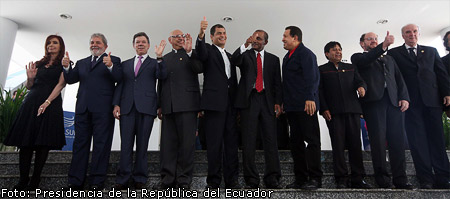UNASUR Countries Against the Empire
December 3, 2010

Due to the minor difficulties which should not take long to resolve, at the moment the UNASUR focuses on coordination among the member countries, leaving it for later on to form the alliance's council of ministers, parliament, common judiciary, and the Latin American military organization. The strategic mission of the alliance is to achieve tight integration of the member economies within the coming 15-20 years and to establish the corresponding zone of free trade. The December, 2008 UNASUR summit which was hosted by Brazil passed the resolution on the creation of the South American defense council, which would be coordinating the UNASUR joint efforts in the security sphere as well as promoting mid-term and long-term military technology and training unification.
The highlight of the 4th UNASUR summit was the unanimous approval of “The Additional Protocol to the Constitutive Treaty of UNASUR on Commitment to Democracy” which stipulates that the UNASUR countries would mount collective resistance to any attempts to displace legitimate governments on the continent. From now on, the protocol is going to be an integral element of the UNASUR charter and an instrument of neutralizing various internal and external subversive activities.
The initiative to put together the protocol is credited to president of Ecuador Rafael Correa who narrowly escaped an attempt on his life during a coup instigated by the US jointly with the defiant Ecuadoran police forces and army officers corps. Clearly, the recent ouster of legitimate Honduran president Manuel Zelaya – another development attributable to the US involvement – also influenced the common UNASUR position.
The protocol says the measures in response to a breach of democratic order in an UNASUR country would include partial or complete closure of land borders, suspension and/or limitation of trade, air and maritime traffic, communications and provision of energy, services and supplies, suspension of the right to participate in the various bodies and branches of UNASUR, as well as the suspension of the rights and benefits enjoyed under the Constitutive Treaty of UNASUR. Other UNASUR countries would do their best to prevent perpetrators from communicating with various regional organizations or receiving aid from “the centers of power” which contributed to the coup.
Venezuelan leader Hugo Chavez described the protocol as a significant document that would enable the UNASUR to protect democracy and to suppress coups and destabilization attempts which remain a permanent threat to the region's countries, especially Bolivia, Ecuador, and Venezuela. The theme of the US subversive activity targeting the UNASUR countries was invoked in the addresses in a veiled form, but the underlying logic of the Protocol was an open secret.
It is time to put an end to Washington's meddling in the domestic affairs of Latin American countries regardless of the pretexts cited by Washington such as struggle against terrorism, drug trafficking, smuggling, and human trafficking. Latin Americans can handle their own problems independently. For example, Venezuela decided to stop cooperating with the US Drug Enforcement Administration, the result being a drastic increase in the indicators of anti-drug raid efficiency. In Venezuela, DEA focused on spying on H. Chavez's regime rather than made serious efforts to help beat the drug business.
At the opening of the summit, the attendees commemorated former Argentinian president and UNASUR secretary general Néstor Carlos Kirchner who accomplished a lot during his relatively short term in office and was instrumental in the UNASUR member countries' reaching consensus over an array of basic issues. Kirchner's death might have resulted from the strain imposed on his health by his self-sacrificial service.
Brazil's Luiz Inácio Lula da Silva, Uruguay's Tabaré Ramón Vázquez Rosas, and Chili's Verónica Michelle Bachelet Jeria were regarded by the summit as potential successors to Kirchner. The forum made no final decision on the candidacy and left the issue to the next summit. President of Guyana Bharrat Jagdeo is to serve as the acting head of UNASUR till 2011.
Despite the entrenched territorial dispute between Venezuela and Guyana and the tendency of the external forces to blow the conflict out of proportions, Chavez and Jagdeo seem to be on entirely friendly terms. Guyana takes part in the ALBA activities as an observer and works with the Petrocaribe. The ideological proximity between the United Socialist Party of Venezuela and the Popular Progressive Party of Guyana makes it easier for the countries' leaders to understand each other. Notably, both Chavez and Jagdeo are friends of Russia. Jagdeo prides himself in being a graduate of Russia's Patrice Lumumba Peoples' Friendship University.
For decades, Guyana remained a peripheral player in Latin America and was for the most part engaged economically with the English-speaking countries of the Caribbean. Jagdeo pledged to lift the country out of self-isolation and – with the UNASUR support – get it involved in addressing regional problems.
Georgetown saw yet another event of symbolic importance during the summit: Ecuador and Columbia declared restoring their diplomatic relations, leaving behind the tragedy of March 1, 2008 when the Columbian special forces supported by US aircrafts invaded Ecuador's border region to destroy a FARC camp. Thanks to the UNASUR assistance, the two countries turned the page on the incident.
Predictably, the Latin American summit – in contrast to the recent US Congress-patronized anti-populist form – drew practically no coverage in the pro-US media. Chavez said the gathering in Washington had been an assembly of political crooks, criminals, and terrorists acting as the avant guard in the struggle against the UNASUR. He expressed hope that they will never manage to instill divisions in the alliance which is constantly getting stronger.